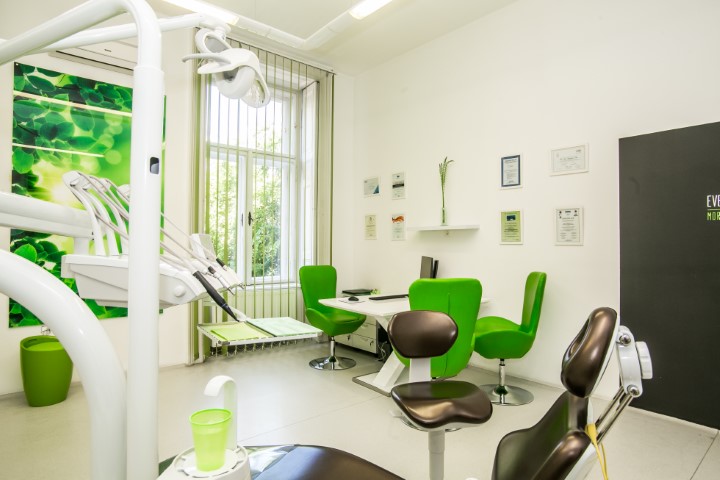General anaesthesia
We can offer – in conjunction with our anesthesiologist team – the option of general anaesthesia as well, so that one can be getting put to sleep at the dentist to have a pleasant time during treatment, without even noticing what is happening. We are specialized in treatments conducted in general anaesthesia, therefore many tremulous patients choose us consciously as we have the best dentists for nervous patients. We are ready to provide you with detailed information on this method.
We have been working for many years on an exclusive basis with the team of Dr. Béla Szabó, the head anaesthetist of the Military Hospital in Budapest who has a more than 30-year experience.
At Evergreen Dental, almost exclusively in Budapest, we are specialized in administering dental treatments and oral surgery while the patient is under general anaesthesia as the conditions are met on a high level in accordance with the European standards at our clinic.
The patient can spend the time after the intervention, uniquely, in the comfort of the recovery room where she or he can even be with relatives.

Important information
Anaesthesia is provided by a highly trained team of specialists.
The anaesthesia is provided with intravenous drugs. Along that the anaesthesiologist administers painkillers and sedatives. To achieve complete painlessness, the dentist applies local anaesthesia at the area of the procedure.
The anesthesiology team is present during the whole operation and supervises the procedure during anaesthesia. After the dentist is done with the treatment, the anesthesiologist suspends the anaesthesia, which results in your awakening in a few minutes. A calm awakening after the procedure is guaranteed by the waking room, furnished for this purpose, where you can be together with your relatives.
If you have any other questions regarding general anaesthesia, don’t hesitate to ask the specialists at Evergreen Dental. We will answer all of your questions.
FAQ
What preparation is needed for general anaesthesia?
We require the following information before every general anesthesia:
- Blood and urine exminition result (general, with kidney and liver function and blood clotting)
- EKG
- Referral from your GP that he/she allows general anesthesia incl the following information:
- What kind of illness(es) do you or did you have?
- Are you currently under any kind of medicine treatment?
- What does you doctor think, how do you treat you illness(es)?
- Your blooe type
- Chest X-ray (over 50 years)
- Negativ PCR Test result
- Completed anamnesis data sheet (we will send this form to you)
- Height and weight
You cannot eat, drink or smoke 6 hours before the general anesthesia. To make this easier for you, we usually do the general anesthetic treatments in the morning. Before a general anesthetic treatment, our anesthetist always consults with the patient to discuss the most important things again.
When can I leave the clinic after a general anaesthesia?
After the treatment the patient remains in the recovery room as long as needed in a calm ambience. We observe the patient permanently without disturbing and also family members or company have access. The recovery room is designed accordingly. When leaving the clinic our driver always takes the patient to the place of accommodation and makes sure that the patients arrives in the room safely.
When is it not possible to have a general anaesthesia?
When we have received all the data, we can decide whether we can carry out your treatment under general anesthesia. After receiving and analyzing the data, we reserve the right to deny the general anesthesia.

The advantages of general anaesthesia
- Much faster, more work can be done during one treatment (e.g. extractions, bone graft and implantation in one session)
- Therefore the overall treatment time can be shortened as healing time only applies once
- Very comfortable as the patient is sleeping during the treatment
- It doesn’t hurt and the patient doesn’t remember anything therefore no post-traumatic problems can occur
Arrive to Budapest 2 days before your treatment and have the necessary tests for the general anaesthesia done here.
We will organise everything, you just need to come!
This service costs 150€.
Sedation

If the doctor determines that you are not suitable for general anaesthesia, you do not need to worry as dental sedation is still an option.
Intravenous sedation can induce a modified state of consciousness and can be requested for any dental procedure. Our aim is to make it widely accessible to patients who suffer from dental phobia. We understand the importance of being able to perform dental procedures on fearful patients under sedation to avoid postponed treatments that can lead to more severe problems. However, it is important to note that sedation does not mean deep sleep. Our anesthesiologists and dental/surgical colleagues can usually evaluate in advance whether sedation is enough for you.
The advantages of sedation
- Reduced anxiety and nervousness: Dental sedation can alleviate such emotions, helping patients to relax and reducing the discomfort caused by anxiety.
- Easier and more comfortable treatment: dental sedation makes it easier for patients to be treated, as it is less painful and more comfortable. In a relaxed state, patients are usually able to cooperate better with the dentist, which allows for faster and more efficient treatment.
- Reduced pain and discomfort: dental sedation allows patients to feel less pain and discomfort during the procedure. This can be particularly important for longer, more complex procedures that require prolonged periods of sitting in the chair.
THE PROCESS OF SEDATION
- Before starting treatment, the patient must fill in a questionnaire, which includes details of any previous medical conditions and any medicines they may have taken. Our doctors use this information to find out about the patient’s state of health.
- Our doctor will explain in detail the expected course of treatment and possible complications to the patient.
- In order to ensure the safety of the patient’s sedation, our doctor will examine the patient and answer any questions. Once fully informed, the patient signs a consent form.
- During the procedure, the patient will be given a continuous intravenous dose of anaesthetic “cocktail” (e.g. propofol, dormicum, neodolpasse) under the supervision of a specialist, which will help to make the procedure painless and work in conjunction with the dental anaesthetics. The doctor will monitor the patient’s heart function, pulse, blood pressure and blood oxygen levels.
- After the procedure, the patient is observed for 30-60 minutes and then discharged home with a companion after the important post-sedation information.
